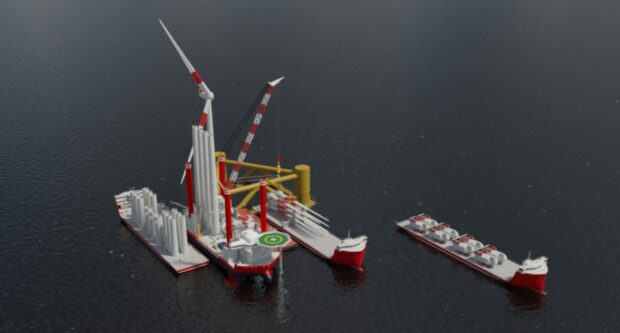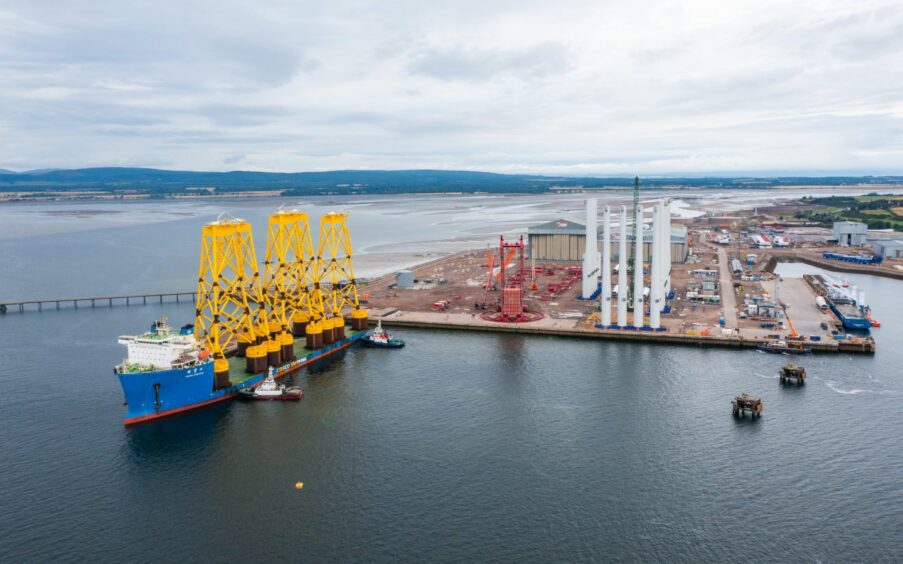Norwegian shipping firm Fred Olsen is exploring the potential of a mobile quayside in the north should the Opportunity Cromarty Firth (OCF) bid to become a green freeport succeed.
OCF said the “mobile port solution (MPS)” would enhance the floating offshore wind supply chain “not least in the Highlands”.
The consortium added it would also contribute to establishing a floating offshore wind cluster in Inverness and the Cromarty Firth.
If it goes ahead, Fred Olsen’s MPS system would build on existing infrastructure.
A combined wind turbine installation and storage barge would be located at a suitable location in the Cromarty Firth, creating enough space and ideal working conditions during pre-assembly, pre-commissioning and turbine installation on a floating foundation.
The project would be led by the firm’s Fred Olsen 1848 division.
Its chief executive Sofie Olsen Jebsen said: “Our journey in renewables began 30 years ago.
“Today, Fred Olsen-related companies employ more than 2,500 people within the renewable energy sector and have in-depth experience from offshore wind.
“With more than 380 people employed in Scotland across the Fred Olsen-related companies, our focus has always been to create value for the Scottish economy, local suppliers and communities.”
Ms Jebsen added: “By setting up the mobile port solution in the firth, Fred Olsen 1848 would provide an immediate solution for the rapid and cost-efficient installation of floating offshore wind, enabling the creation of new, attractive green job opportunities – not only to the Firth but also for the UK in general.
“This presents an opportunity for the whole Scottish supply chain, including Fred Olsen 1848 and other Fred Olsen-related companies, and we support the Inverness and Cromarty Firth green freeport bid.”
‘Ideal geographical location’
Further backing for OCF’s green freeport bid came from Fred Olsen 1848 chief commercial officer Esben Strandgaard Kyndesen.
Mr Kyndesen said Inverness and the Cromarty Firth had “the ideal geographical location” for a floating offshore wind cluster as recommended by the Scottish Offshore Wind Energy Council in a recent independent report.
He added: “Cromarty Firth offers ideal infrastructure and competencies for manufacturing, assembly and integration of floating offshore wind structures at the size and scale required by the industry, which will be enhanced further with the mobile port solution.“
Skilled jobs on a level not seen since the 1970s oil boom”
Bob Buskie, chief executive, Port of Cromarty Firth.
Port of Cromarty Firth chief executive Bob Buskie said the importance of green freeport status, not only to the Highlands but Scotland as a whole, could not be underestimated.
Mr Buskie added: “It would bring skilled green jobs and high-wage opportunities on a level not seen since the 1970s oil boom.
“The Fred Olsen 1848 mobile port solution would increase available infrastructure and be used in conjunction with existing port facilities at Invergordon and Nigg.
“It would also enable the firth to support a larger number of offshore wind projects and accelerate the shift to green energy.”
The OCF consortium is backed by port owners Port of Cromarty Firth, Global Energy Group, Port of Inverness and Highland Council, as well as Inverness Chamber of Commerce and more than a dozen regional businesses, public sector organisations and academic bodies.
OCF believes the creation of such a zone centred on the firth and Inverness will maximise local and Scotland-wide benefits from a pipeline of renewable energy projects, placing the Highlands at the heart of the drive towards net-zero and create tens of thousands of jobs.
The closest competition to win the status is thought to be between the OCF bid and the North East Scotland Green Freeport consortium.
Another strong bid has been made by Forth Ports taking in partners between Edinburgh and Grangemouth.
Orkney Council has also thrown its hat into the ring for a green freeport, with Glasgow is also angling for the status with its Clyde Green Freeport proposal.



Conversation